8A Unit 5 Wild Animals 单元巩固复习 课件(36张)
文档属性
| 名称 | 8A Unit 5 Wild Animals 单元巩固复习 课件(36张) | 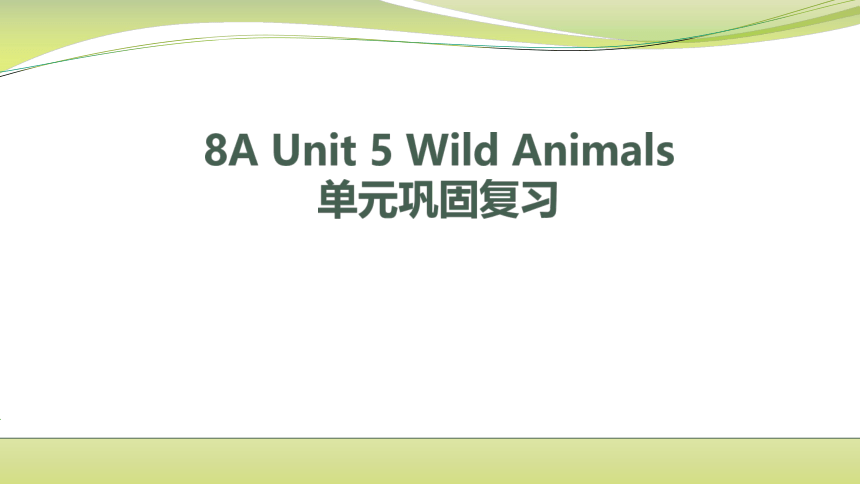 | |
| 格式 | zip | ||
| 文件大小 | 181.3KB | ||
| 资源类型 | 教案 | ||
| 版本资源 | 牛津译林版 | ||
| 科目 | 英语 | ||
| 更新时间 | 2021-12-22 19:27:24 | ||
图片预览

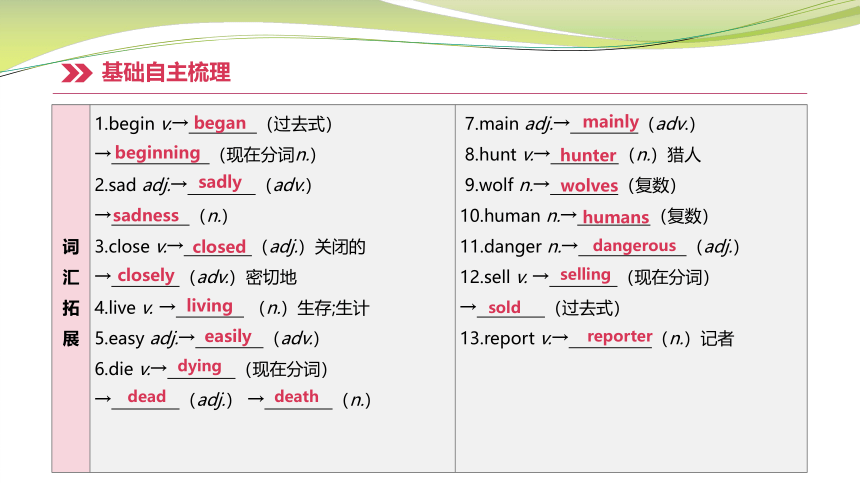
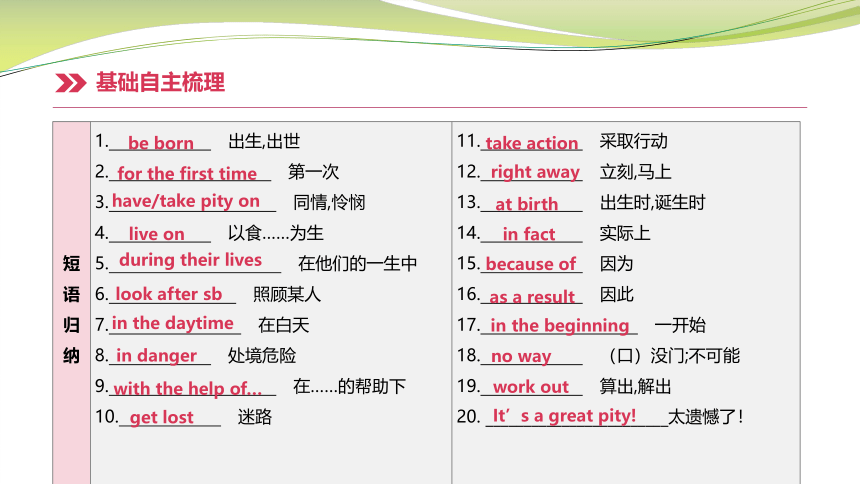
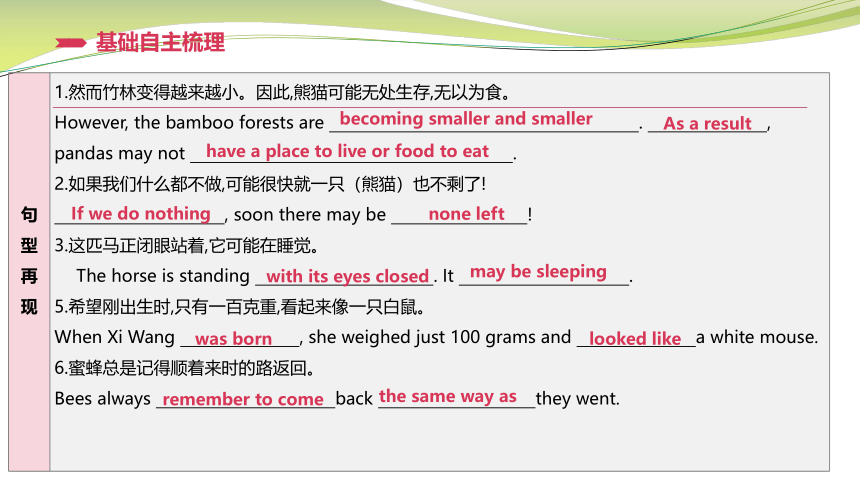
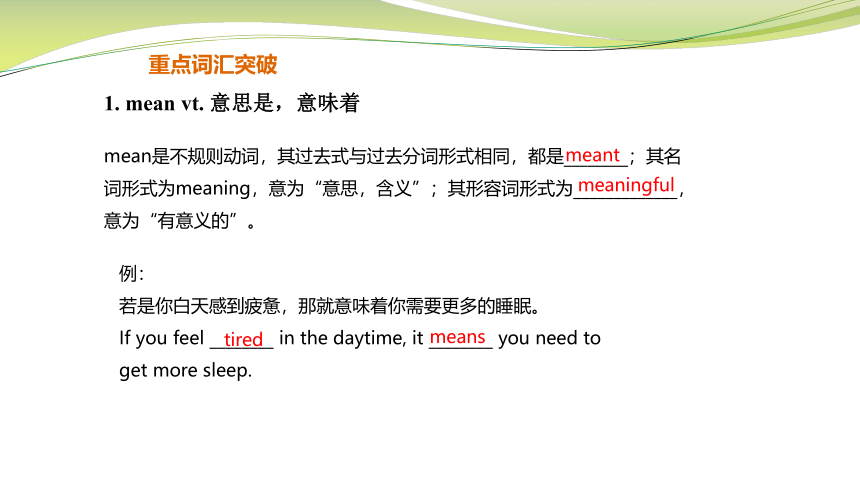
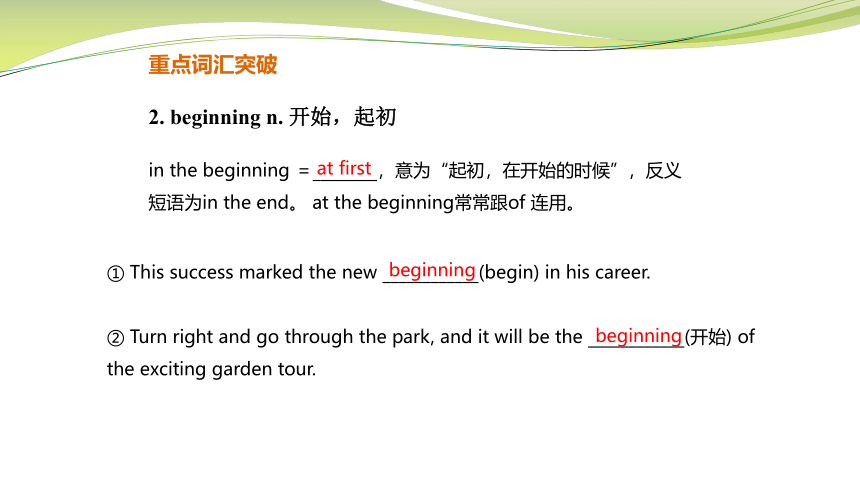
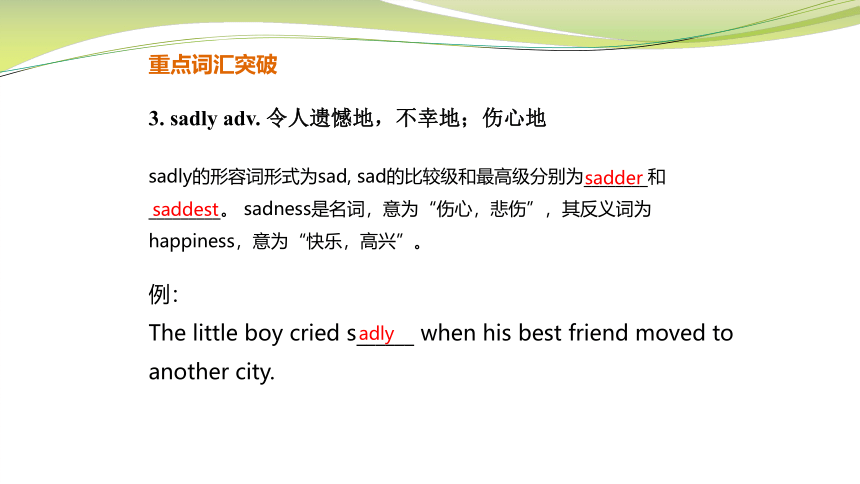
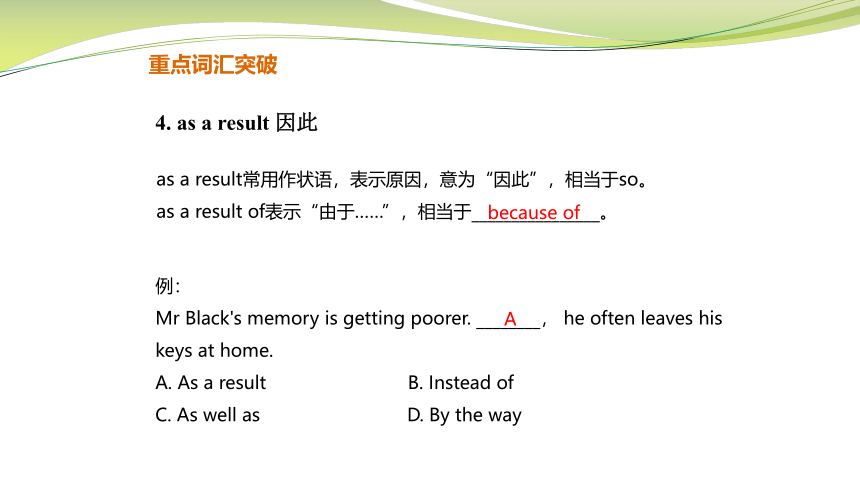
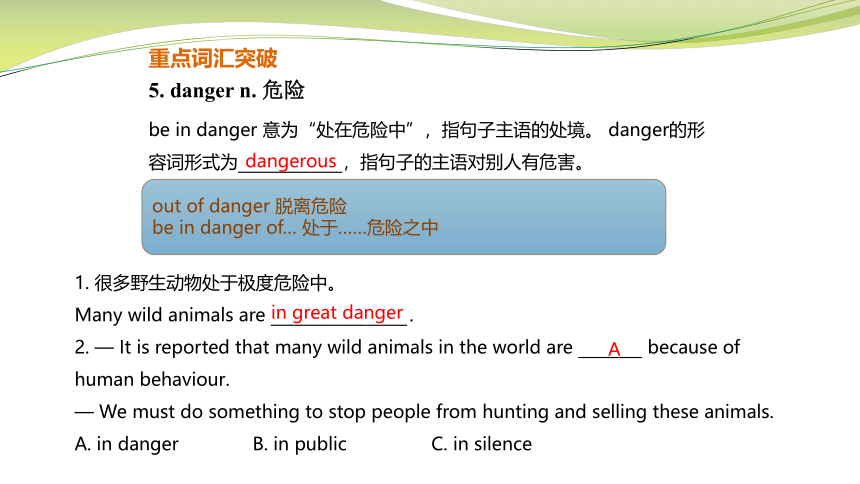
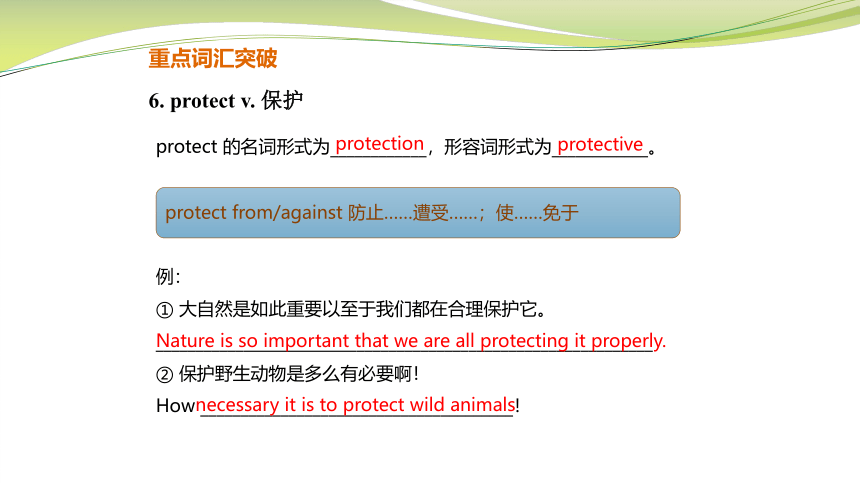


文档简介
(共36张PPT)
8A Unit 5 Wild Animals
单元巩固复习
词 汇 拓 展 1.begin v.→ (过去式) → (现在分词n.) 2.sad adj.→ (adv.) → (n.) 3.close v.→ (adj.)关闭的 → (adv.)密切地 4.live v. → (n.)生存;生计 5.easy adj.→ (adv.) 6.die v.→ (现在分词) → (adj.) → (n.) 7.main adj.→ (adv.)
8.hunt v.→ (n.)猎人
9.wolf n.→ (复数)
10.human n.→ (复数)
11.danger n.→ (adj.)
12.sell v. → (现在分词)
→ (过去式)
13.report v.→ (n.)记者
基础自主梳理
began
beginning
sadly
sadness
closed
closely
living
easily
mainly
hunter
wolves
humans
dying
dead
death
dangerous
selling
sold
reporter
短 语 归 纳 1. 出生,出世 2. 第一次 3. 同情,怜悯 4. 以食……为生 5. 在他们的一生中 6. 照顾某人 7. 在白天 8. 处境危险 9. 在……的帮助下 10. 迷路 11. 采取行动
12. 立刻,马上
13. 出生时,诞生时
14. 实际上
15. 因为
16. 因此
17. 一开始
18. (口)没门;不可能
19. 算出,解出
20. ________________________太遗憾了!
基础自主梳理
for the first time
have/take pity on
live on
during their lives
look after sb
in the daytime
in danger
with the help of…
get lost
take action
right away
at birth
in fact
be born
work out
because of
as a result
in the beginning
no way
It’s a great pity!
句 型 再 现 1.然而竹林变得越来越小。因此,熊猫可能无处生存,无以为食。
However, the bamboo forests are . , pandas may not .
2.如果我们什么都不做,可能很快就一只(熊猫)也不剩了!
, soon there may be !
3.这匹马正闭眼站着,它可能在睡觉。
The horse is standing . It .
5.希望刚出生时,只有一百克重,看起来像一只白鼠。
When Xi Wang , she weighed just 100 grams and a white mouse.
6.蜜蜂总是记得顺着来时的路返回。
Bees always back they went.
基础自主梳理
becoming smaller and smaller
As a result
have a place to live or food to eat
If we do nothing
none left
with its eyes closed
may be sleeping
was born
looked like
remember to come
the same way as
重点词汇突破
1. mean vt. 意思是,意味着
mean是不规则动词,其过去式与过去分词形式相同,都是________;其名词形式为meaning,意为“意思,含义”;其形容词形式为_____________,意为“有意义的”。
meant
meaningful
例:
若是你白天感到疲惫,那就意味着你需要更多的睡眠。
If you feel ________ in the daytime, it ________ you need to get more sleep.
tired
means
2. beginning n. 开始,起初
in the beginning =________,意为“起初,在开始的时候”,反义短语为in the end。 at the beginning常常跟of 连用。
at first
重点词汇突破
① This success marked the new ____________(begin) in his career.
② Turn right and go through the park, and it will be the ____________(开始) of the exciting garden tour.
beginning
beginning
3. sadly adv. 令人遗憾地,不幸地;伤心地
sadly的形容词形式为sad, sad的比较级和最高级分别为________和_________。 sadness是名词,意为“伤心,悲伤”,其反义词为happiness,意为“快乐,高兴”。
sadder
saddest
重点词汇突破
例:
The little boy cried s______ when his best friend moved to another city.
adly
4. as a result 因此
as a result常用作状语,表示原因,意为“因此”,相当于so。 as a result of表示“由于……”,相当于________________。
because of
重点词汇突破
例:
Mr Black's memory is getting poorer. ________, he often leaves his keys at home.
A. As a result B. Instead of
C. As well as D. By the way
A
5. danger n. 危险
be in danger 意为“处在危险中”,指句子主语的处境。 danger的形容词形式为_____________,指句子的主语对别人有危害。
dangerous
out of danger 脱离危险
be in danger of… 处于……危险之中
重点词汇突破
1. 很多野生动物处于极度危险中。
Many wild animals are _________________.
2. — It is reported that many wild animals in the world are ________ because of human behaviour.
— We must do something to stop people from hunting and selling these animals.
A. in danger B. in public C. in silence
in great danger
A
6. protect v. 保护
protect 的名词形式为____________,形容词形式为____________。
protection
protective
protect from/against 防止……遭受……;使……免于
重点词汇突破
例:
① 大自然是如此重要以至于我们都在合理保护它。
______________________________________________________________
② 保护野生动物是多么有必要啊!
How _______________________________________!
Nature is so important that we are all protecting it properly.
necessary it is to protect wild animals
7. save vt. & vi. 储存,节省
save money 省钱
save one’s life 救命
save time 节约时间
重点词汇突破
① We shouldn't waste water. Instead, we should ________(节约) it.
② This medicine ______ millions of people's lives if it is put into use.
A. is saving B. will save
C. has saved D. had saved
save
B
8. while n. 一会儿,一段时间
after a _______ 过了一会儿
in a short/little while 不久
once in a while 间或,偶尔,每隔一些时候
while
重点词汇突破
( )— Have you ever played ________ football
— Yes, I did when I was little, but I haven't played for ________ while now.
A. the; the B. the; a C. /; a D. /; the
C
9. catch vt. 捉住,捕获
catch的过去式和过去分词都是________。
caught
catch the ball 接住球
catch up with sb. 赶上某人
catch the early bus 赶上早班车
catch a cold 感冒
重点词汇突破
① 坚持练习,你会很轻易地接到球。
Keep practising, and you'll __________________________.
② The office worker _________(catch) the early bus to work every day.
catch the ball easily
catches
10. human n. 人
human作名词讲时,相当于human being,用来区别动物、机器等概念;________多指单个的人,可以指男人、女人、大人、小孩,其复数形式是persons;________泛指人们, the people指人民或特指人们; man指“男人”时是可数名词,指“人类,所有的人”时是不可数名词。
person
people
重点词汇突破
What a useful robot! It can help with the housework like a ________(人的) servant.
human
11. sell vt. & vi. 卖,出售
sell的现在分词为selling;过去式为________; 反义词为buy;名词形式为sale。
sold
sell off 廉价卖掉 sell high 以高价出售 sell out 卖完
sell sb. sth.=sell sth. to sb. 把某物卖给某人
sell well 卖得好 on sale 出售,上市
重点词汇突破
通往北京的火车票很畅销。
Train tickets to Beijing ________________ .
sell well
12. report n. 报告
report指人的名词是__________,意为“记者”。
reporter
make a _________ 做报告
a report on sth. 一篇关于某事的报道
report to… 向……汇报/报道
It is reported that… 据报道……,据传……
report
重点词汇突破
Bill will be a(n) ________ to interview the players in the coming sports meeting.
A. guest B. reporter C. tourist D. engineer
B
易混词汇
1. die, dying, death与 dead
(1) ________作动词,意为“死,死亡”,是非延续性动词,不能与表示一段时间的状语连用。
(2) ________作形容词,意为“将死的,垂死的”,还可作die的现在分词。
die
dying
(3) ________作名词,意为“死,死亡”,在句中作主语或宾语。
(4) ________ 作形容词,意为“死亡的”,与be动词连用,常用来作定语、表语或补语,表示“死”的状态。
death
dead
die of 因……而死(原因多来自内部)
die from 由于……而死(原因多来自外部)
die out 灭绝
(1) It was his first time to speak in front of his class and he was scared to
_________(die).
(2) The boy had to make a living by himself after his parents’ _________(die).
(3) Stan Lee, a famous American comic book writer, has been _________(die)
for about two years, but the fictional characters he created are still alive on screen.
(4) The old man ________ a car accident yesterday. His family are very sad now.
A. died from B. died of C. died away D. died down
Have a try!
death
death
dead
A
易混词汇
2. accept与receive
(1) ________表示主观上的接受,多是接受抽象的东西,如想法、表扬、批评、道歉等。
(2) receive仅表示客观上的收到,不表示主观上是否愿意接受,多是接受实际的东西,如信件、礼物等,常与from连用。
accept
① I will be happy if Sandy __________(接受) my offer.
② I won't ________ your application until you complete the survey.
A. accept B. receive C. be accepted D. be received
accepts
A
易混词汇
3. open, close与closed
(1) open可以作动词,意为“打开,公开”;也可以作形容词,意为“公开的;营业着的”。
(2) close作动词,意为“关,结束”,作形容词时意为“紧密的,亲密的”。
(3) ________只能作形容词,意为“关着的,不公开的”。
closed
— Excuse me, do you know ________ yesterday
— Sure. It closed at 6:00 p.m. yesterday.
A. when the bookshop closes B. when does the bookshop close
C. when the bookshop closed D. when did the bookshop close
C
易混词汇
4. none与no one及 nothing
(1) none
a. 既可指人又可指物,反义词是all。
b. 用于三者或三者以上,意为“没有人;没有什么东西;一个也不”。
c. 它与of连用,修饰名词复数或代词宾格复数作主语,谓语动词既可用单数又可用复数,多用单数。
d. 一般可用来回答“how many + n.” “how much + n.”及含“any + n.”引起的疑问句。
(2) no one
a. no one意为“没有人”,只能指人,不能与____连用。
b. no one作主语时,谓语动词只能用单数形式。
c. 可用来回答who及含anyone, anybody引起的疑问句。
of
(3) nothing
a. nothing意为“没有东西”,只能指物,不能与____连用。
b. nothing作主语时,谓语动词只能用单数形式。
c. 可用来回答what及含anything引起的疑问句。
of
( )① — Who was hurt in the traffic accident
— ________.
A. None B. No one C. Nothing
( )② — Don't be angry with your kid when he makes a mistake again, will you
— No, I won't. I know that ________ of us are perfect after all.
A. none B. neither
C. each D. all
B
A
核心句型
1. So could you please not eat them
那么请你别吃它们好吗?
“Can/Could you please do sth.?”用来表示请求别人做某事。这是can/could的一般疑问句结构,但并非询问对方有无能力做某事,而是向对方提出请求,意为“请你……好吗?”。 could在此并非can的过去式,而是一个独立的情态动词,语气比can更委婉。其否定形式是“Can/Could you please ________ sth.?”,意为“请你别……好吗?”。
not to
— Could you go to the bookshop with me I want to buy The Grass House by Cao Wenxuan.
— Sorry, I ________. I've promised Mum to go home right after school.
A. can’t B. couldn't C. needn't D. mustn't
A
核心句型
2. When Xi Wang was born, she weighed just 100 grams and looked like a white mouse.
当“希望”出生时,她只有一百克重,而且看起来像只白鼠。
be born意为“出生,出世”,由于谈论的人或动物通常已经出生,所以其中的be动词常用过去式________或________。
was
were
— Could you please tell me ________?
— In a village in Guilin.
A. when were you born B. when you were born
C. where you were born D. where were you born
C
核心句型
3. At four months old, she weighed about eight kilograms and started to go outside for the first time.
四个月时,她就重约8千克了,而且她开始了第一次的外出活动。
at four months old是“at +基数词+ month(s)/year(s) +old”结构,表示“在几个月大/在几岁的时候”。在……岁时还可用短语at the ________ of表示。
age
He left school and began work ________ twelve.
A. at the age of B. at the beginning of
C. at the top of D. at the bottom of
A
核心句型
4. Eight months later, she was not a small baby any more ...
8个月之后,她就不再是个小宝宝了……
not ...any more意为“不再”,相当于________ more。 not ...any longer/no longer 通常指时间上不再延长。 not ...any more/no more 通常指在数量和程度上不再增加。
no
请不要再嘲笑你的同学了。你应该与他们和睦相处。
Please don't ____________ your classmates _____________. You should get along well with them.
laugh at
any more
核心句型
5. Bats can't see, but they can decide to fly the right way with the help of their mouth and ears.
蝙蝠看不见,但是它们在嘴巴和耳朵的帮助下能决定按正确的路线飞行。
with the help of ... 在……的帮助下;
__________ the help of ... 没有……的帮助。
without
The blind man walked across the street ________ the help of a boy.
A. by B. at C. in D. with
D
核心句型
6. Bees always remember to come back the same way as they went.
蜜蜂总是记得按照原路返回。
the same ________ as 与……同样的大小;
the same ________ as 与……同样的颜色;
the same ______ as 与……同样的年龄。
size
colour
age
There will be fewer jobs for people because some robots will do ___________________________(与人们相同的工作).
the same jobs as people
重点语法
1. 用may表示可能性
(1) 情态动词may可以用来表示可能性,此时意为“也许,可能”,可表示现在的可能,也可表示将来的可能。
(2) 在疑问句中表示可能性常用________而不用may。
(3) can和may在表示可能性时的区别:
用 can 表示的“可能”往往指逻辑上的“可能性”;而用 may 表示的“可能”则指事实上的“可能性”。如:
The road can be blocked. 这条路可能会堵。
意思是说: It is possible for the road to be blocked. 对于这条路来说堵起来是有可能的。(比如车多、路窄等客观原因会造成这条路的拥堵。)
can
The road may be blocked.
这条路也许堵了。
意思是说: It is possible that the road is blocked. 这条路可能正堵着。(比如看到车辆拥挤不往前行,判断路堵了。)
(1) If we don’t protect nature, some wildlife ______die out in the future.
A. must B. need C. should D. may
(2) ---Tom, where is Kitty
--- She______ be in the garden. She sometimes plays with her dog there.
A. can B. may C. must D. shall
D
B
重点语法
2. 动词不定式
动词不定式的一般结构是“___ +动词原形”。动词不定式是一种非谓语动词形式,它没有人称和数的变化,也不受主语的人称和数的制约,在句子中可以作谓语之外的各种成分,也可以有自己的宾语,因此又称为“非谓语动词”。
to
本单元学习动词不定式作宾语的用法:
(1) 动词不定式可以跟在动词后面作宾语,常见的可以跟动词不定式作宾语的动词有: agree, begin, decide, fail, forget, hope, learn, plan, prepare, remember, try, want, like, choose等。
(2) 动词不定式还可以用在glad, happy, pleased, sorry, sad, afraid等一些表示情感的形容词后面作宾语。
① Please promise ___________(not tell) lies any more, will you
② Tom has decided ________ a part time job after he graduates from school.
A. do B. to do C. did D. doing
not to tell
B
随堂精炼
一、单项选择。
1.— ________ I see your ID card, sir — No problem. Here you are.
A. Can B. May C. Need D. Must
2. — Have you decided where to go for your summer vacation
— Not yet. We ________ go to Qingdao. It is a good place for vacation.
A. need B. should C. may D. must
3. She got up to get some sleeping pills but found there was ________ left at home.
A. nothing B. none C. something D. nobody
4. — I'm new here. I don't know how to solve the problem
— Don't worry. I'll do what I can ________ you.
A. help B. to help C. invite D. to invite
B
C
B
B
二、 用括号中所给词的适当形式填空。
1. It's amazing that our eyes are the same size from ________(born).
2. ________(sad), David had to leave us to deal with the things in his new restaurant.
3. Sandy's bedroom looks very ________(tidy). What a mess!
4. Everything must have a (begin).
5. Now many wild animals are in __________(dangerous). We should protect them.
birth
Sadly
untidy
beginning
danger
Thank you!
8A Unit 5 Wild Animals
单元巩固复习
词 汇 拓 展 1.begin v.→ (过去式) → (现在分词n.) 2.sad adj.→ (adv.) → (n.) 3.close v.→ (adj.)关闭的 → (adv.)密切地 4.live v. → (n.)生存;生计 5.easy adj.→ (adv.) 6.die v.→ (现在分词) → (adj.) → (n.) 7.main adj.→ (adv.)
8.hunt v.→ (n.)猎人
9.wolf n.→ (复数)
10.human n.→ (复数)
11.danger n.→ (adj.)
12.sell v. → (现在分词)
→ (过去式)
13.report v.→ (n.)记者
基础自主梳理
began
beginning
sadly
sadness
closed
closely
living
easily
mainly
hunter
wolves
humans
dying
dead
death
dangerous
selling
sold
reporter
短 语 归 纳 1. 出生,出世 2. 第一次 3. 同情,怜悯 4. 以食……为生 5. 在他们的一生中 6. 照顾某人 7. 在白天 8. 处境危险 9. 在……的帮助下 10. 迷路 11. 采取行动
12. 立刻,马上
13. 出生时,诞生时
14. 实际上
15. 因为
16. 因此
17. 一开始
18. (口)没门;不可能
19. 算出,解出
20. ________________________太遗憾了!
基础自主梳理
for the first time
have/take pity on
live on
during their lives
look after sb
in the daytime
in danger
with the help of…
get lost
take action
right away
at birth
in fact
be born
work out
because of
as a result
in the beginning
no way
It’s a great pity!
句 型 再 现 1.然而竹林变得越来越小。因此,熊猫可能无处生存,无以为食。
However, the bamboo forests are . , pandas may not .
2.如果我们什么都不做,可能很快就一只(熊猫)也不剩了!
, soon there may be !
3.这匹马正闭眼站着,它可能在睡觉。
The horse is standing . It .
5.希望刚出生时,只有一百克重,看起来像一只白鼠。
When Xi Wang , she weighed just 100 grams and a white mouse.
6.蜜蜂总是记得顺着来时的路返回。
Bees always back they went.
基础自主梳理
becoming smaller and smaller
As a result
have a place to live or food to eat
If we do nothing
none left
with its eyes closed
may be sleeping
was born
looked like
remember to come
the same way as
重点词汇突破
1. mean vt. 意思是,意味着
mean是不规则动词,其过去式与过去分词形式相同,都是________;其名词形式为meaning,意为“意思,含义”;其形容词形式为_____________,意为“有意义的”。
meant
meaningful
例:
若是你白天感到疲惫,那就意味着你需要更多的睡眠。
If you feel ________ in the daytime, it ________ you need to get more sleep.
tired
means
2. beginning n. 开始,起初
in the beginning =________,意为“起初,在开始的时候”,反义短语为in the end。 at the beginning常常跟of 连用。
at first
重点词汇突破
① This success marked the new ____________(begin) in his career.
② Turn right and go through the park, and it will be the ____________(开始) of the exciting garden tour.
beginning
beginning
3. sadly adv. 令人遗憾地,不幸地;伤心地
sadly的形容词形式为sad, sad的比较级和最高级分别为________和_________。 sadness是名词,意为“伤心,悲伤”,其反义词为happiness,意为“快乐,高兴”。
sadder
saddest
重点词汇突破
例:
The little boy cried s______ when his best friend moved to another city.
adly
4. as a result 因此
as a result常用作状语,表示原因,意为“因此”,相当于so。 as a result of表示“由于……”,相当于________________。
because of
重点词汇突破
例:
Mr Black's memory is getting poorer. ________, he often leaves his keys at home.
A. As a result B. Instead of
C. As well as D. By the way
A
5. danger n. 危险
be in danger 意为“处在危险中”,指句子主语的处境。 danger的形容词形式为_____________,指句子的主语对别人有危害。
dangerous
out of danger 脱离危险
be in danger of… 处于……危险之中
重点词汇突破
1. 很多野生动物处于极度危险中。
Many wild animals are _________________.
2. — It is reported that many wild animals in the world are ________ because of human behaviour.
— We must do something to stop people from hunting and selling these animals.
A. in danger B. in public C. in silence
in great danger
A
6. protect v. 保护
protect 的名词形式为____________,形容词形式为____________。
protection
protective
protect from/against 防止……遭受……;使……免于
重点词汇突破
例:
① 大自然是如此重要以至于我们都在合理保护它。
______________________________________________________________
② 保护野生动物是多么有必要啊!
How _______________________________________!
Nature is so important that we are all protecting it properly.
necessary it is to protect wild animals
7. save vt. & vi. 储存,节省
save money 省钱
save one’s life 救命
save time 节约时间
重点词汇突破
① We shouldn't waste water. Instead, we should ________(节约) it.
② This medicine ______ millions of people's lives if it is put into use.
A. is saving B. will save
C. has saved D. had saved
save
B
8. while n. 一会儿,一段时间
after a _______ 过了一会儿
in a short/little while 不久
once in a while 间或,偶尔,每隔一些时候
while
重点词汇突破
( )— Have you ever played ________ football
— Yes, I did when I was little, but I haven't played for ________ while now.
A. the; the B. the; a C. /; a D. /; the
C
9. catch vt. 捉住,捕获
catch的过去式和过去分词都是________。
caught
catch the ball 接住球
catch up with sb. 赶上某人
catch the early bus 赶上早班车
catch a cold 感冒
重点词汇突破
① 坚持练习,你会很轻易地接到球。
Keep practising, and you'll __________________________.
② The office worker _________(catch) the early bus to work every day.
catch the ball easily
catches
10. human n. 人
human作名词讲时,相当于human being,用来区别动物、机器等概念;________多指单个的人,可以指男人、女人、大人、小孩,其复数形式是persons;________泛指人们, the people指人民或特指人们; man指“男人”时是可数名词,指“人类,所有的人”时是不可数名词。
person
people
重点词汇突破
What a useful robot! It can help with the housework like a ________(人的) servant.
human
11. sell vt. & vi. 卖,出售
sell的现在分词为selling;过去式为________; 反义词为buy;名词形式为sale。
sold
sell off 廉价卖掉 sell high 以高价出售 sell out 卖完
sell sb. sth.=sell sth. to sb. 把某物卖给某人
sell well 卖得好 on sale 出售,上市
重点词汇突破
通往北京的火车票很畅销。
Train tickets to Beijing ________________ .
sell well
12. report n. 报告
report指人的名词是__________,意为“记者”。
reporter
make a _________ 做报告
a report on sth. 一篇关于某事的报道
report to… 向……汇报/报道
It is reported that… 据报道……,据传……
report
重点词汇突破
Bill will be a(n) ________ to interview the players in the coming sports meeting.
A. guest B. reporter C. tourist D. engineer
B
易混词汇
1. die, dying, death与 dead
(1) ________作动词,意为“死,死亡”,是非延续性动词,不能与表示一段时间的状语连用。
(2) ________作形容词,意为“将死的,垂死的”,还可作die的现在分词。
die
dying
(3) ________作名词,意为“死,死亡”,在句中作主语或宾语。
(4) ________ 作形容词,意为“死亡的”,与be动词连用,常用来作定语、表语或补语,表示“死”的状态。
death
dead
die of 因……而死(原因多来自内部)
die from 由于……而死(原因多来自外部)
die out 灭绝
(1) It was his first time to speak in front of his class and he was scared to
_________(die).
(2) The boy had to make a living by himself after his parents’ _________(die).
(3) Stan Lee, a famous American comic book writer, has been _________(die)
for about two years, but the fictional characters he created are still alive on screen.
(4) The old man ________ a car accident yesterday. His family are very sad now.
A. died from B. died of C. died away D. died down
Have a try!
death
death
dead
A
易混词汇
2. accept与receive
(1) ________表示主观上的接受,多是接受抽象的东西,如想法、表扬、批评、道歉等。
(2) receive仅表示客观上的收到,不表示主观上是否愿意接受,多是接受实际的东西,如信件、礼物等,常与from连用。
accept
① I will be happy if Sandy __________(接受) my offer.
② I won't ________ your application until you complete the survey.
A. accept B. receive C. be accepted D. be received
accepts
A
易混词汇
3. open, close与closed
(1) open可以作动词,意为“打开,公开”;也可以作形容词,意为“公开的;营业着的”。
(2) close作动词,意为“关,结束”,作形容词时意为“紧密的,亲密的”。
(3) ________只能作形容词,意为“关着的,不公开的”。
closed
— Excuse me, do you know ________ yesterday
— Sure. It closed at 6:00 p.m. yesterday.
A. when the bookshop closes B. when does the bookshop close
C. when the bookshop closed D. when did the bookshop close
C
易混词汇
4. none与no one及 nothing
(1) none
a. 既可指人又可指物,反义词是all。
b. 用于三者或三者以上,意为“没有人;没有什么东西;一个也不”。
c. 它与of连用,修饰名词复数或代词宾格复数作主语,谓语动词既可用单数又可用复数,多用单数。
d. 一般可用来回答“how many + n.” “how much + n.”及含“any + n.”引起的疑问句。
(2) no one
a. no one意为“没有人”,只能指人,不能与____连用。
b. no one作主语时,谓语动词只能用单数形式。
c. 可用来回答who及含anyone, anybody引起的疑问句。
of
(3) nothing
a. nothing意为“没有东西”,只能指物,不能与____连用。
b. nothing作主语时,谓语动词只能用单数形式。
c. 可用来回答what及含anything引起的疑问句。
of
( )① — Who was hurt in the traffic accident
— ________.
A. None B. No one C. Nothing
( )② — Don't be angry with your kid when he makes a mistake again, will you
— No, I won't. I know that ________ of us are perfect after all.
A. none B. neither
C. each D. all
B
A
核心句型
1. So could you please not eat them
那么请你别吃它们好吗?
“Can/Could you please do sth.?”用来表示请求别人做某事。这是can/could的一般疑问句结构,但并非询问对方有无能力做某事,而是向对方提出请求,意为“请你……好吗?”。 could在此并非can的过去式,而是一个独立的情态动词,语气比can更委婉。其否定形式是“Can/Could you please ________ sth.?”,意为“请你别……好吗?”。
not to
— Could you go to the bookshop with me I want to buy The Grass House by Cao Wenxuan.
— Sorry, I ________. I've promised Mum to go home right after school.
A. can’t B. couldn't C. needn't D. mustn't
A
核心句型
2. When Xi Wang was born, she weighed just 100 grams and looked like a white mouse.
当“希望”出生时,她只有一百克重,而且看起来像只白鼠。
be born意为“出生,出世”,由于谈论的人或动物通常已经出生,所以其中的be动词常用过去式________或________。
was
were
— Could you please tell me ________?
— In a village in Guilin.
A. when were you born B. when you were born
C. where you were born D. where were you born
C
核心句型
3. At four months old, she weighed about eight kilograms and started to go outside for the first time.
四个月时,她就重约8千克了,而且她开始了第一次的外出活动。
at four months old是“at +基数词+ month(s)/year(s) +old”结构,表示“在几个月大/在几岁的时候”。在……岁时还可用短语at the ________ of表示。
age
He left school and began work ________ twelve.
A. at the age of B. at the beginning of
C. at the top of D. at the bottom of
A
核心句型
4. Eight months later, she was not a small baby any more ...
8个月之后,她就不再是个小宝宝了……
not ...any more意为“不再”,相当于________ more。 not ...any longer/no longer 通常指时间上不再延长。 not ...any more/no more 通常指在数量和程度上不再增加。
no
请不要再嘲笑你的同学了。你应该与他们和睦相处。
Please don't ____________ your classmates _____________. You should get along well with them.
laugh at
any more
核心句型
5. Bats can't see, but they can decide to fly the right way with the help of their mouth and ears.
蝙蝠看不见,但是它们在嘴巴和耳朵的帮助下能决定按正确的路线飞行。
with the help of ... 在……的帮助下;
__________ the help of ... 没有……的帮助。
without
The blind man walked across the street ________ the help of a boy.
A. by B. at C. in D. with
D
核心句型
6. Bees always remember to come back the same way as they went.
蜜蜂总是记得按照原路返回。
the same ________ as 与……同样的大小;
the same ________ as 与……同样的颜色;
the same ______ as 与……同样的年龄。
size
colour
age
There will be fewer jobs for people because some robots will do ___________________________(与人们相同的工作).
the same jobs as people
重点语法
1. 用may表示可能性
(1) 情态动词may可以用来表示可能性,此时意为“也许,可能”,可表示现在的可能,也可表示将来的可能。
(2) 在疑问句中表示可能性常用________而不用may。
(3) can和may在表示可能性时的区别:
用 can 表示的“可能”往往指逻辑上的“可能性”;而用 may 表示的“可能”则指事实上的“可能性”。如:
The road can be blocked. 这条路可能会堵。
意思是说: It is possible for the road to be blocked. 对于这条路来说堵起来是有可能的。(比如车多、路窄等客观原因会造成这条路的拥堵。)
can
The road may be blocked.
这条路也许堵了。
意思是说: It is possible that the road is blocked. 这条路可能正堵着。(比如看到车辆拥挤不往前行,判断路堵了。)
(1) If we don’t protect nature, some wildlife ______die out in the future.
A. must B. need C. should D. may
(2) ---Tom, where is Kitty
--- She______ be in the garden. She sometimes plays with her dog there.
A. can B. may C. must D. shall
D
B
重点语法
2. 动词不定式
动词不定式的一般结构是“___ +动词原形”。动词不定式是一种非谓语动词形式,它没有人称和数的变化,也不受主语的人称和数的制约,在句子中可以作谓语之外的各种成分,也可以有自己的宾语,因此又称为“非谓语动词”。
to
本单元学习动词不定式作宾语的用法:
(1) 动词不定式可以跟在动词后面作宾语,常见的可以跟动词不定式作宾语的动词有: agree, begin, decide, fail, forget, hope, learn, plan, prepare, remember, try, want, like, choose等。
(2) 动词不定式还可以用在glad, happy, pleased, sorry, sad, afraid等一些表示情感的形容词后面作宾语。
① Please promise ___________(not tell) lies any more, will you
② Tom has decided ________ a part time job after he graduates from school.
A. do B. to do C. did D. doing
not to tell
B
随堂精炼
一、单项选择。
1.— ________ I see your ID card, sir — No problem. Here you are.
A. Can B. May C. Need D. Must
2. — Have you decided where to go for your summer vacation
— Not yet. We ________ go to Qingdao. It is a good place for vacation.
A. need B. should C. may D. must
3. She got up to get some sleeping pills but found there was ________ left at home.
A. nothing B. none C. something D. nobody
4. — I'm new here. I don't know how to solve the problem
— Don't worry. I'll do what I can ________ you.
A. help B. to help C. invite D. to invite
B
C
B
B
二、 用括号中所给词的适当形式填空。
1. It's amazing that our eyes are the same size from ________(born).
2. ________(sad), David had to leave us to deal with the things in his new restaurant.
3. Sandy's bedroom looks very ________(tidy). What a mess!
4. Everything must have a (begin).
5. Now many wild animals are in __________(dangerous). We should protect them.
birth
Sadly
untidy
beginning
danger
Thank you!
